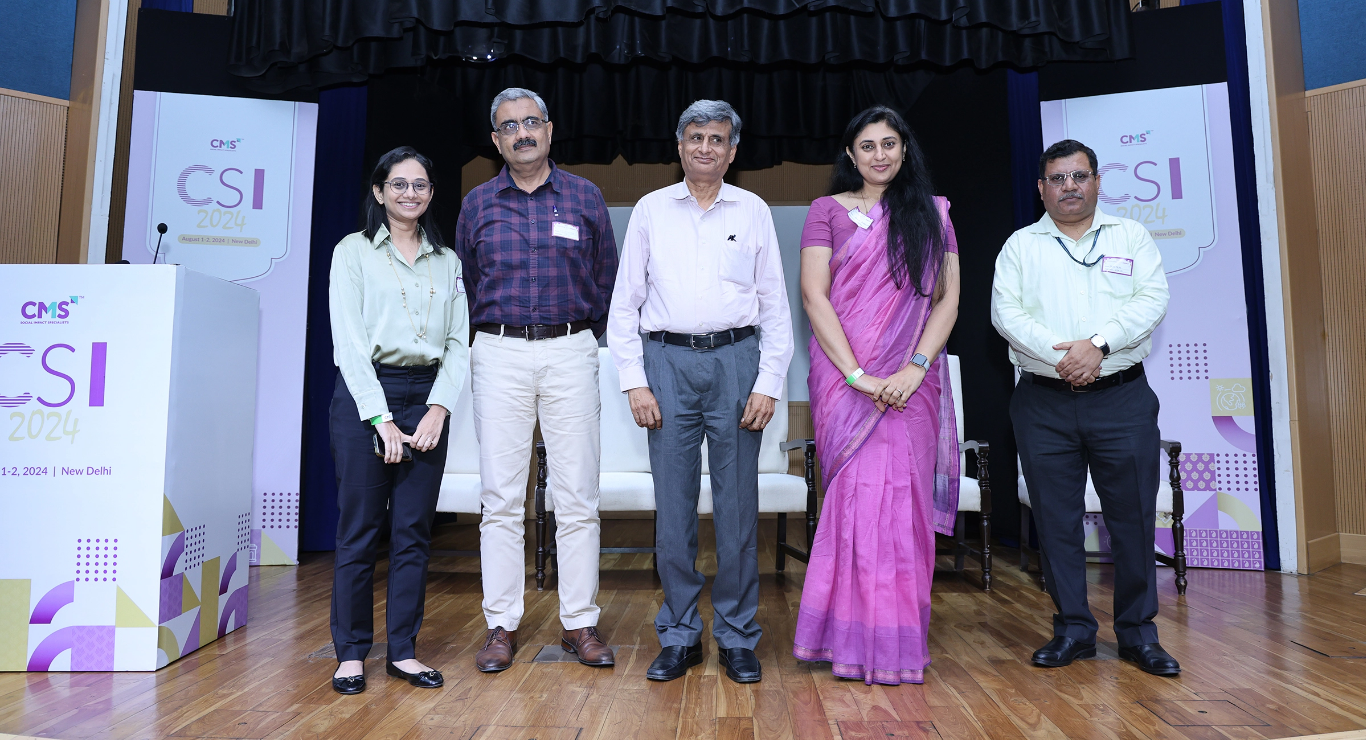
Innovative Finance
The theme of innovative finance emerged as a powerful catalyst for transformation in the social sector.

The theme of innovative finance emerged as a powerful catalyst for transformation in the social sector.
Across sessions, key common themes surfaced, illustrating the sectoral challenges and opportunities inherent in reshaping the financial landscape for social good. Discussions on innovative financing models such as social stock exchanges, micro-finance paradigms, and outcome-based finance (OBF) shed light on the evolving funding ecosystem in the backdrop of India’s economic growth. The quest for unlocking essential funds for meaningful change reverberated through each dialogue, emphasising the need for revolutionary approaches to financing in a world of shifting paradigms.
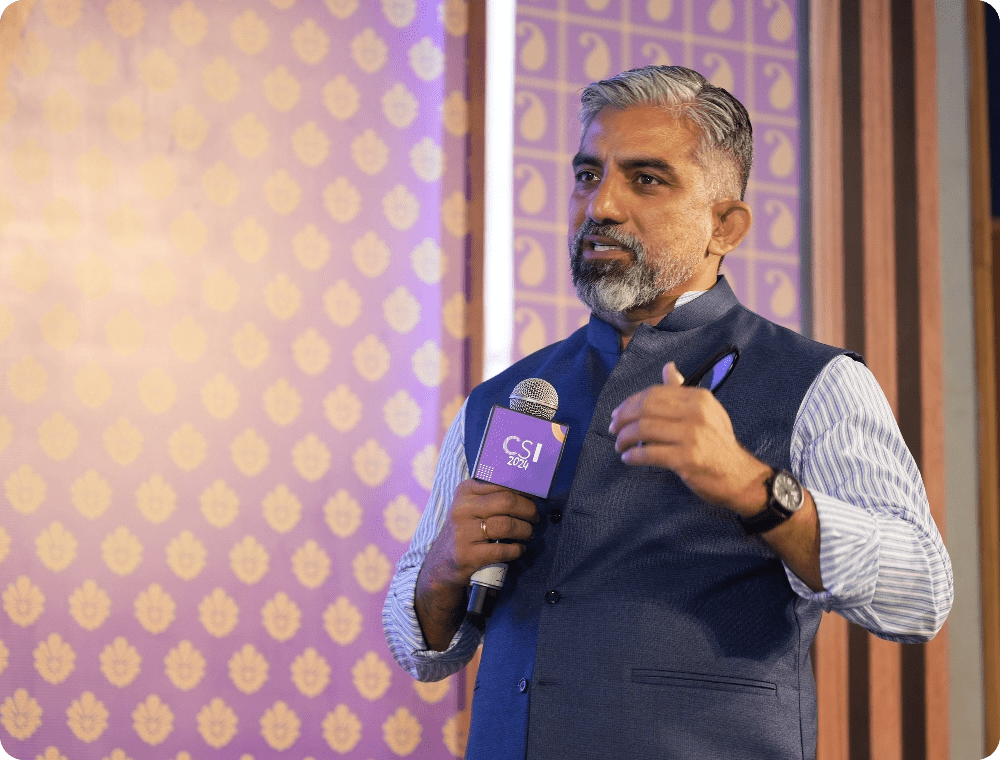
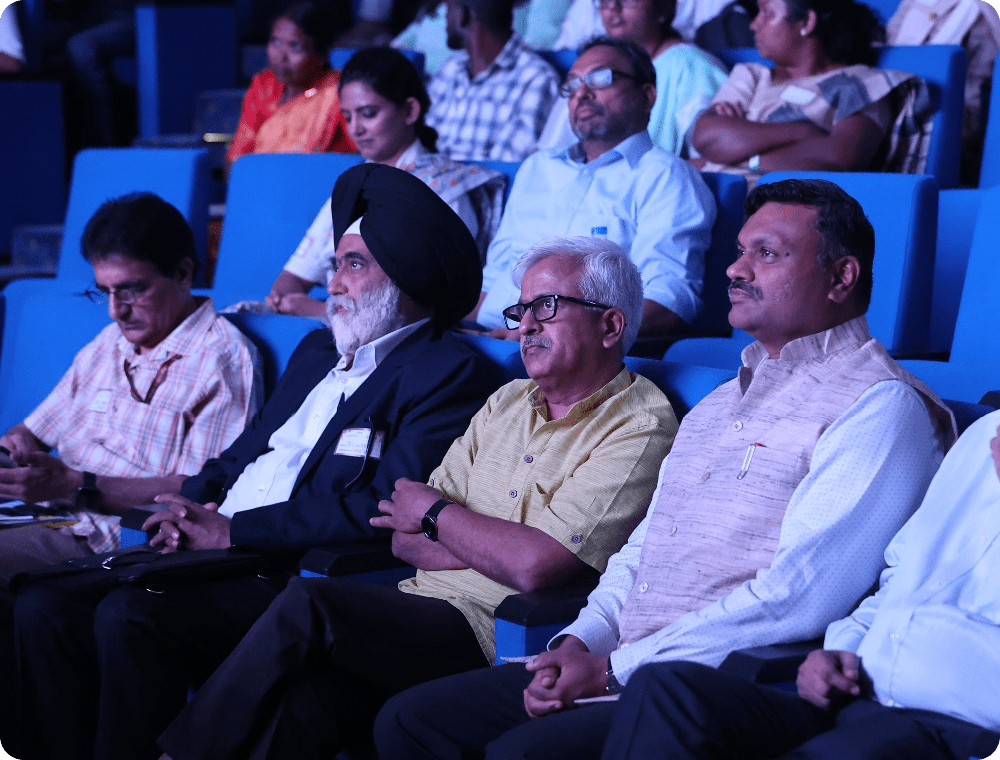
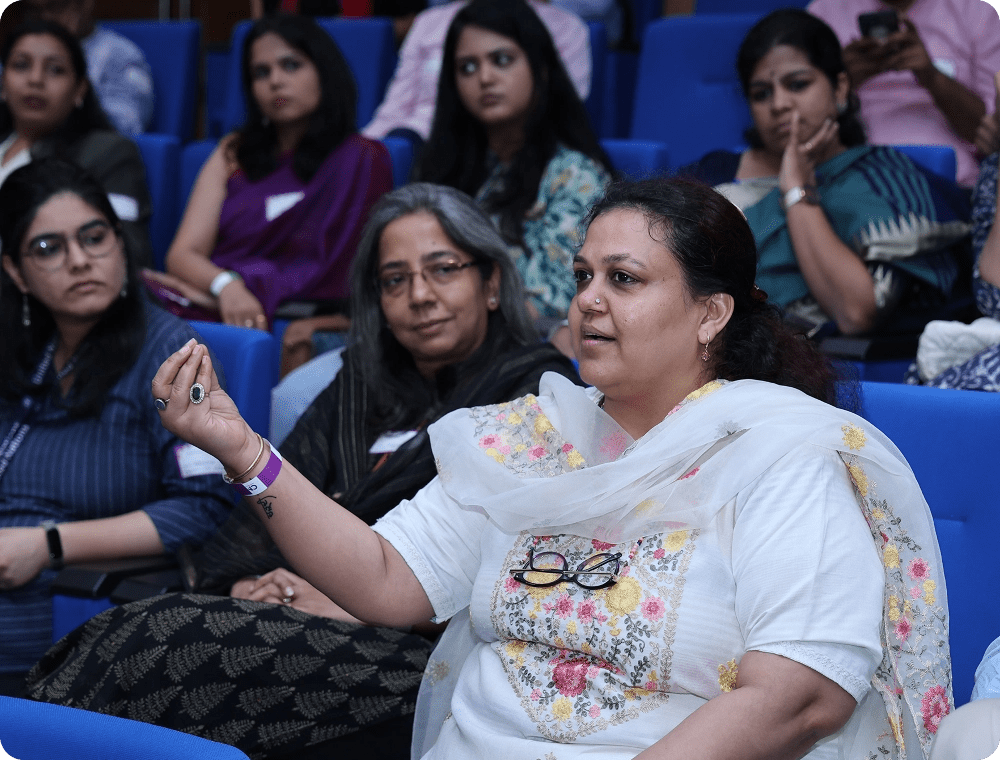
The discussions at CSI underscored the need for collaboration between the government and civil society to drive social impact through commercial ventures. The government’s role in creating enabling policies and regulatory frameworks was emphasised, while civil society was urged to engage more actively with government initiatives. Blended finance, philanthropic capital, and outcome-based financing were identified as key tools for mobilising capital towards sustainability and development goals, especially in sectors like energy, agriculture, and education.
Amidst the labyrinth of challenges, the sessions noted the critical role of blended finance, philanthropic capital, and outcome-based financing as instrumental tools for driving social impact through commercial ventures. The delicate balance between impact and returns, complexities of implementation, and the imperative of cross-sectoral partnerships emerged as recurrent motifs in the narrative of financial innovation.
Capacity building and flexibility in programme design were identified as crucial factors for the success of these funding models. Participants emphasised the need for tailored financial products that offer credit guarantees and flexible repayment terms to support women entrepreneurs and micro and nano entrepreneurs in scaling their businesses.
Overall, CSI 2024 showcased India’s progress in social impact funding and emphasised the need for continued innovation and collaboration to address the evolving challenges in the social sector. By harnessing the potential of innovative financing models and strengthening partnerships between stakeholders, India can pave the way for a brighter and more sustainable future for all.
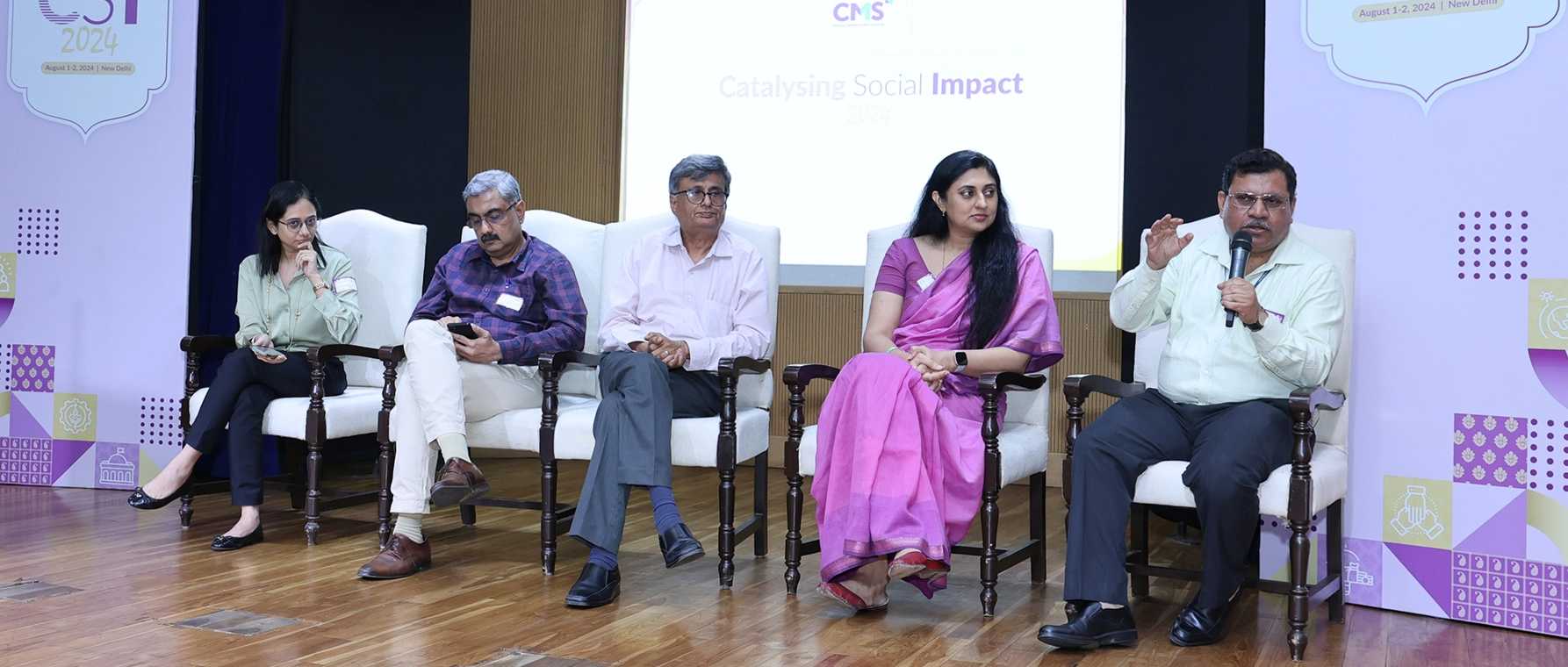

Purnima Jagtiani
Catalyst Management Services

Anushree Parekh
British Asian Trust

HS Vishwanath
Director - Social Business
Catalyst Management
Services

Arun Nalvadi
MagicBus

Kruthi Bharocha
Peepul
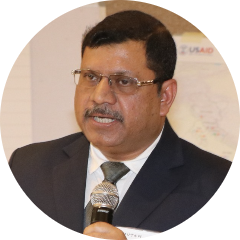
Gautam Chakraborthy
USAID

The session on Outcome-Based Financing (OBF) at the CSI event illuminated its transformative potential in the social sector’s evolving funding landscape. There were discussions on blended finance, philanthropic capital, and outcome-based financing (OBF) as key tools for driving social impact through commercial ventures. The focus of the discussions revolved around the mobilisation of capital for sustainability and development goals, particularly in sectors like energy, agriculture, and education.
Blended finance was emphasised as a mechanism to attract mainstream private capital by leveraging concessional funds from public and philanthropic sources. This approach aims to lower investment risks, making socially impactful projects more attractive to commercial investors. It operates through a variety of financial instruments such as concessionary loans, guarantees, and results-based financing, offering solutions to bridge the gap between for-profit and non-profit ventures. The role of philanthropy and development funding is seen as essential in altering risk profiles and catalysing larger investments.
OBF emphasises the direct linking of payments to results, ensuring accountability and efficacy. It relies on robust data verification to track and measure outcomes, incorporating risk mitigation strategies to address implementation challenges. This approach ensures that performance management is integral to the funding process.
The model represents a strategic shift from traditional grant funding by prioritising measurable outcomes and fostering collaborative partnerships. This flexibility allows organisations to adapt activities while maintaining focus on overarching goals, a significant departure from the rigid structures of conventional grants.
The discussion also highlighted challenges such as balancing impact with returns, the complexities of implementing OBF in various sectors, and the importance of building partnerships between governments, investors, and non-profits. Capacity building and flexibility in programme design were noted as critical for ensuring the success of these financing models.
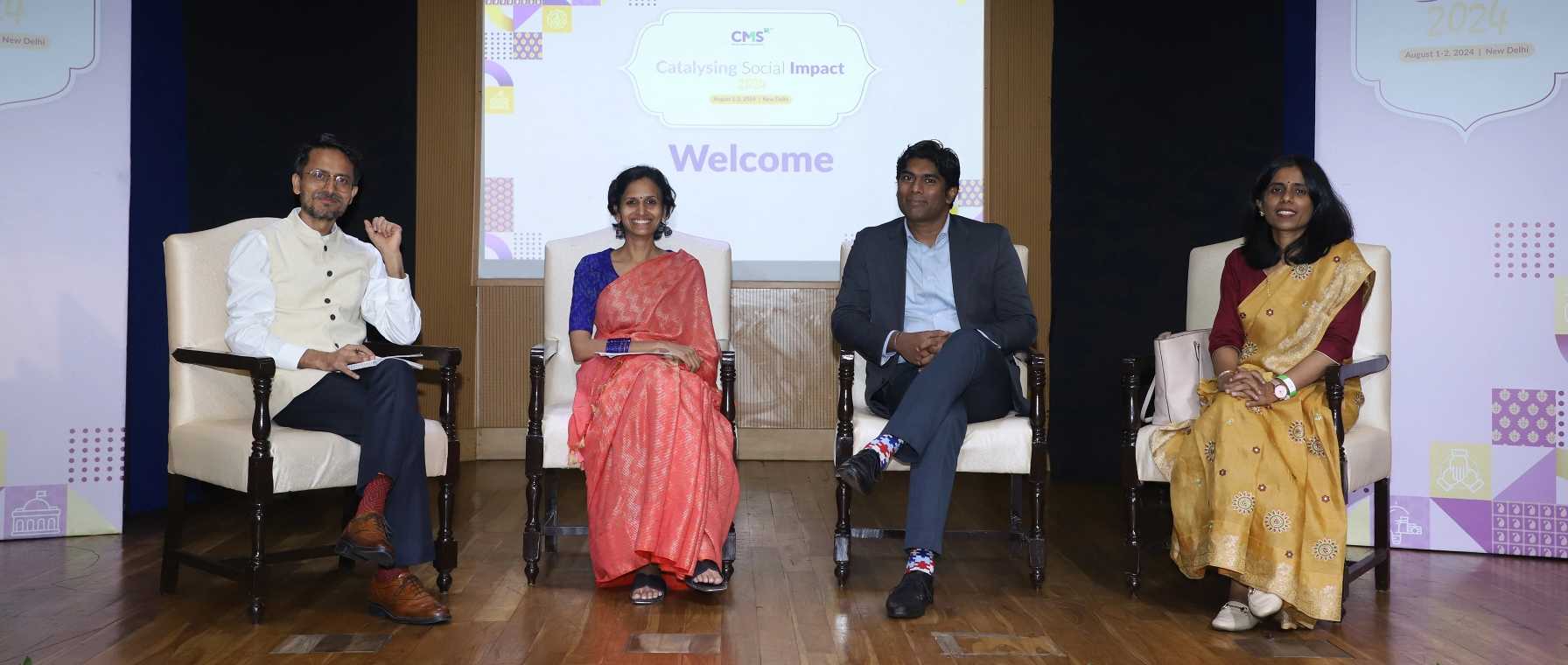
The discussions in the session on Micro-equity: Boosting Growth for Micro and Nano Entrepreneurs centred around the significant challenges faced by women entrepreneurs, particularly those in rural and informal sectors.
Women often encounter institutional barriers when trying to access capital and enter larger markets, which makes scaling their businesses difficult. Moving beyond the village level requires substantial funding, but that capital is often inaccessible due to risk perceptions in the formal financial system. Women entrepreneurs also struggle to break into mainstream markets, which remain opaque and hard to navigate without adequate support and knowledge.
Solutions discussed included Self-Help Groups (SHGs) and cooperatives, which provide decentralised capital through group lending. However, these systems limit individual growth. Transitioning to formal structures like the National Rural Livelihood Mission (NRLM) offers scalable funding to help women expand beyond local confines.
A key innovation was micro-equity, a flexible financing model where repayment is tied to profitability, allowing entrepreneurs to grow without rigid commitments. This model manages risk while providing needed capital. Blended finance was also highlighted, combining philanthropic and commercial capital to tolerate risk and offer more growth opportunities.
However, a significant obstacle that emerged was the lack of consolidated data on SHGs. With millions of women participating in these groups, data integration could have offered an opportunity to better structure lending and financing products, but this remains an untapped area. Additionally, credit access remains a major hurdle, particularly for women who are new to formal financial systems. There is a pressing need for tailored financial products that offer credit guarantees and flexible repayment terms, ensuring that women entrepreneurs can secure the capital they need to grow their businesses.
The session takeaway was that while innovative models like micro-equity and SHG structures have made significant strides in supporting women, more needs to be done. Addressing institutional barriers, providing flexible, risk-cushioned financing, and consolidating data on existing women-led initiatives could drastically improve outcomes for micro and nano entrepreneurs.
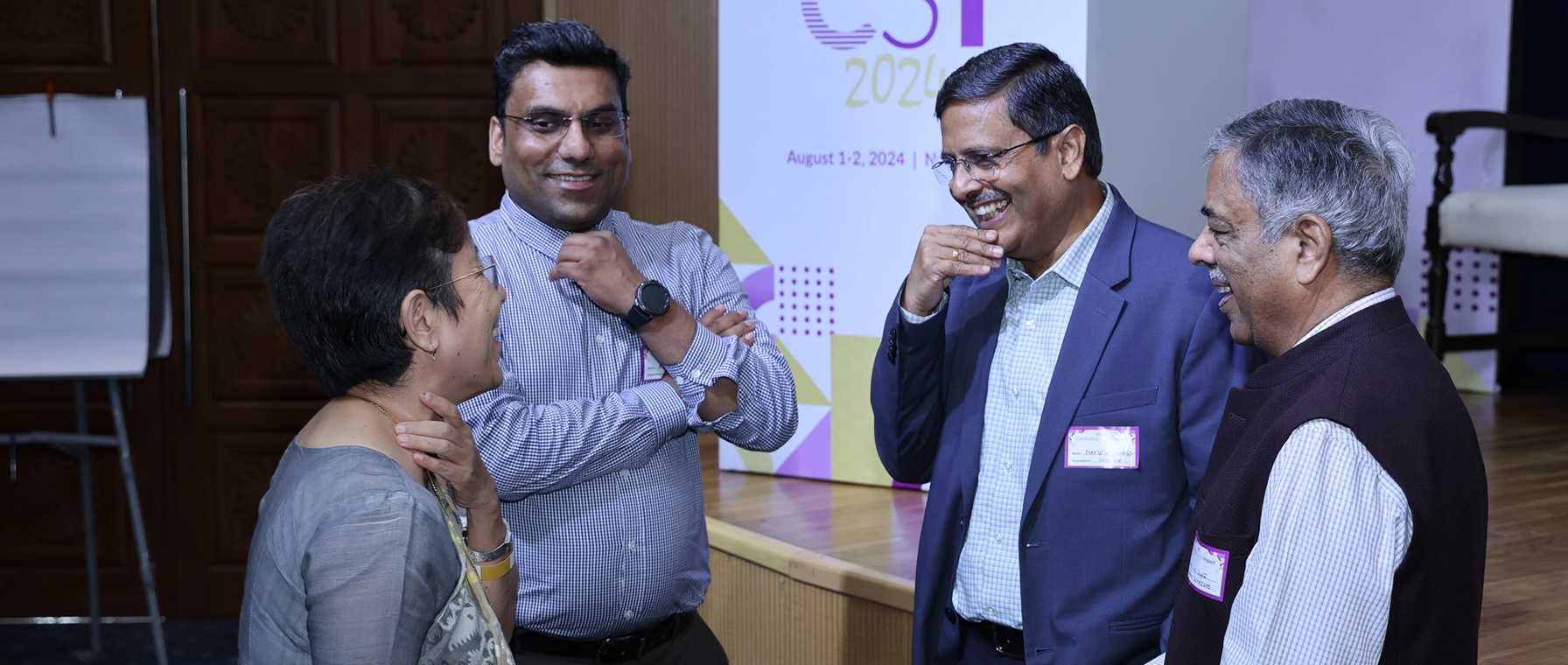

Anju Narayanan

Jotsana Sitling
IFS Officer

Sanjoy Roy
TATA Trust

Mangesh Wange
CEO & Board Member at Swades Foundation

Aanchal Jain
TATA Trust

Vivek Harlalka
Vice President - Investor Awareness / Services & Social Stock Exchange

Amit Gupta
Director-Evidence for Change
Catalyst Management
Services

Dr. Sanjay Gupta
CEO & Board Member at Swades Foundation
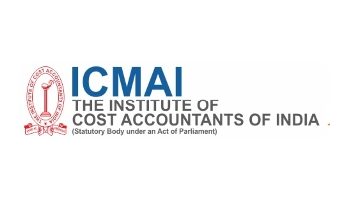

The session focused on exploring how the SSE can revolutionise funding for India’s social sector. The main objectives were to discuss the role of finance strategies, encourage collaborations among stakeholders, and explore the SSE’s potential to bridge gaps between Non-Profit Organisations (NPOs), donors, and investors. These objectives were achieved through discussions that highlighted SSE’s current landscape, challenges, and potential solutions.
There was discussion around the need for NPOs to come forward and register with the SSE, despite challenges that similar platforms have faced globally. While SSE was officially declared in 2019, the first listings only appeared in 2023. However, out of 19,000 eligible NPOs, only 9 have registered, indicating a need for more outreach and capacity-building efforts. The success of SSE depends heavily on building trust and credibility, addressing regulatory barriers, and offering incentives that make it attractive for NPOs to engage.
Another critical point discussed was the importance of blended finance in facilitating social impact. Panelists noted that SSE can democratise funding by using financial instruments such as social venture funds and impact bonds, providing both financial returns and measurable social impact. By leveraging these instruments, the SSE can unlock new funding streams and encourage more investors to participate in the social sector. Mr. Mangesh emphasised the importance of bringing process orientation and discipline to NPOs, which can instil confidence in investors and enhance the credibility of listed organisations.
In terms of policy reform, the panel identified challenges in the current regulatory framework, particularly the complexity and volume of documentation required for NPOs to register and raise funds. Simplifying this process and increasing awareness among donors and investors were highlighted as key actions to promote wider adoption. Collaborations between internal and external stakeholders are essential to refining these processes and ensuring SSE’s success.
The session concluded with a call to empower NPOs to become independent, transparent, and capable of effectively engaging with donors. Workshops and educational initiatives were suggested to help NPOs navigate the registration and listing process, which will ultimately strengthen the SSE’s impact and legitimacy in India’s evolving social sector landscape.
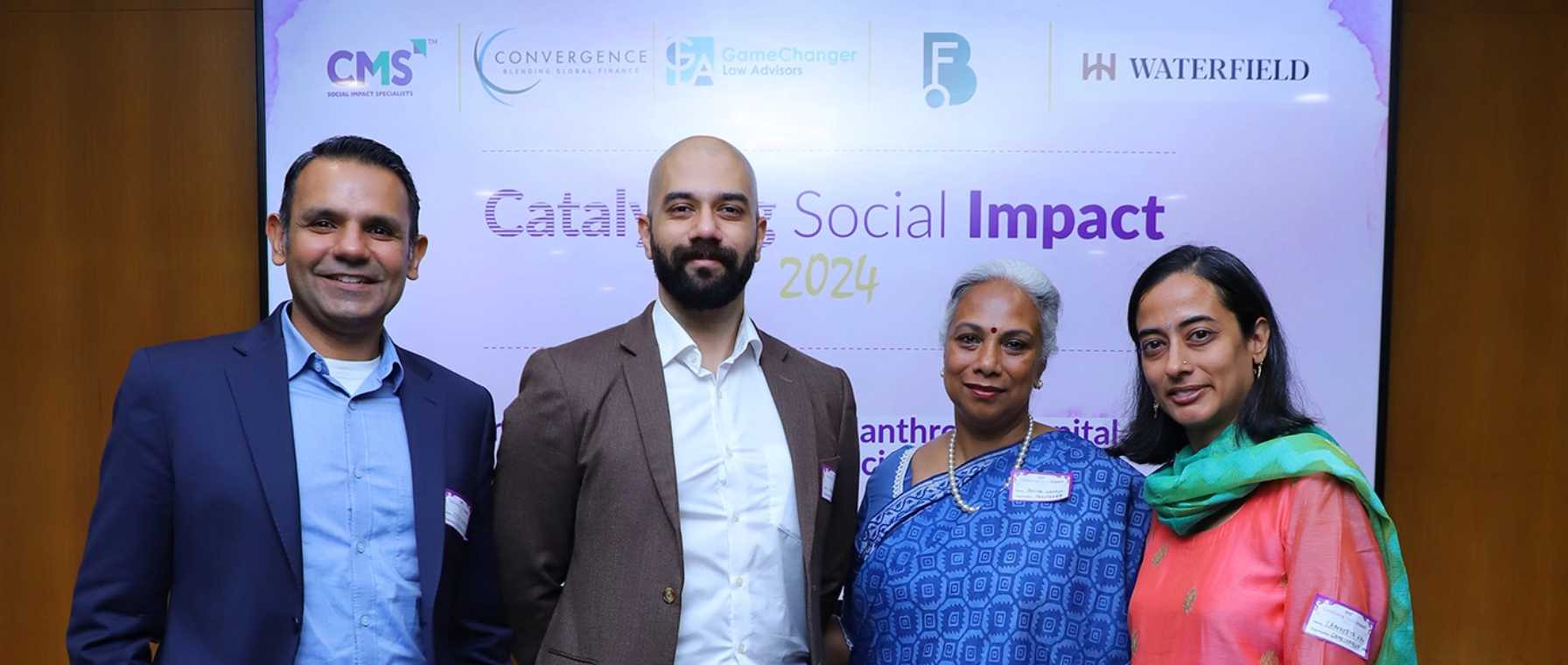

Purnima Jagtiani
Catalyst Management Services

Anita George
ProsperETE

Ritesh Thakkar
Convergence Asia

Nirav Khambhati
The Blended Finance Company

Samheeta Rao
Game Changers Law

Prabhir Correa
Waterfield


The examination of blended finance focused on how it can bridge the gap between social impact and financial returns, especially within India’s development sector. The primary goals were to present global trends in blended finance, highlight case studies of social enterprises utilising philanthropic capital, and encourage discussions on integrating blended finance into participants’ initiatives. These goals were achieved through diverse case studies and expert insights.
One of the standout case studies was shared by Nirav Khambhati from The Blended Finance Company, which is building a $50 million facility to mobilise commercial working capital for MSMEs in the WASH sector. He explained the challenges these enterprises face when raising debt capital, mainly due to insufficient collateral or lack of lender experience in underwriting for this segment. The discussion further explored the broader ethical questions around the commercialisation of basic needs like health and education.
Another interesting example came from Game Changers Law, which presented the use of convertible notes to facilitate soft debt for Me Meraki, a for-profit enterprise working with artisans. This example showed how private, non-philanthropic funds could be structured to benefit both social enterprises and investors.
The case study by Waterfield focused on a pooled UHNI fund that provided capital access to women’s joint liability groups, packaging the investment in a way that emphasised both returns and social impact, appealing to commercial investors without losing the focus on wealth generation for underserved communities.
A key takeaway was that structuring a blended finance program requires a strong Monitoring, Evaluation, and Learning (MEL) framework from day one to build trust among philanthropists and investors.
In short, blended finance, as demonstrated through these case studies, holds transformative potential by making social ventures more “bankable,” helping to align philanthropic goals with commercial returns, and driving capital towards achieving Sustainable Development Goals (SDGs). The panellists emphasised that future efforts should focus on bringing donors, investors, and social enterprises together through well-structured, impact-driven financial instruments.
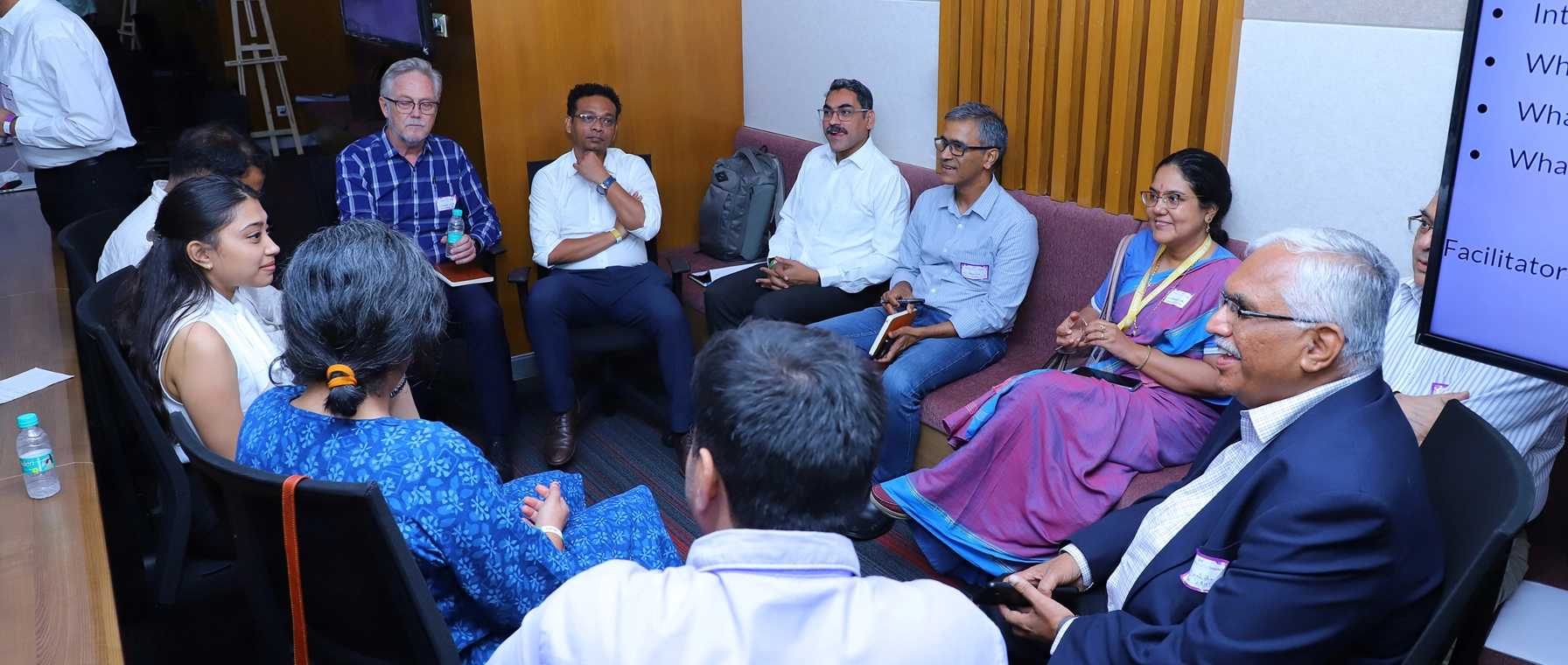

Mr Shirish Joshi
Consultant Organisation Design and Strategic HR

Shambu Prasad Chebrolu
IRMA

Vishwanath HS
Director - Social Business
Catalyst Management Services

Mr CS Reddy
Founder and CEO of APMAS

Mr Parthasarathy
Skill Green
Market access is crucial for the success of Farmer Producer Companies (FPCs) as it directly impacts their ability to be profitable and improve livelihoods for the farmers. The existing agricultural value chains and the institutional frameworks restrict the ability of the farmers and the producer companies to receive a fair price for their produce . These legacy based systems thus need to be disrupted to create new institutional frameworks that reduce the risks being borne by the farmers via a commercial entity that is market facing and incentivises the farmers and the producer companies to focus on improving their productivity , implement package of agricultural practises and primary and secondary processing leading to value addition.
This session delved into the multifaceted challenges hindering the progress of FPCs in the agricultural domain. Participants engaged in insightful conversations focusing on issues such as supply chain inefficiencies, limited bargaining power, and the critical lack of access to formal credit, all of which impede the growth potential of FPCs.
The discussions emphasised the urgent need for innovative solutions that place a strong emphasis on bolstering infrastructure, streamlining financial systems, and implementing proactive market access reforms tailored specifically to suit the dynamic needs of FPCs. These deliberations underscored the importance of empowering FPCs to navigate the complex agricultural landscape with greater efficiency and resilience.
The collaborative efforts within the groups underscored a collective commitment to enhancing governance structures, ensuring financial inclusivity, and fostering sustainable practices within the FPC ecosystem. By advocating for the establishment of a market-oriented federated structure and exploring unconventional strategies such as joint ventures with key buyers, participants aimed to drive FPCs towards greater scalability, market penetration, and sustainability.
The overarching narrative from the session highlighted the imperative need for personalised, forward-thinking solutions that prioritise access to vital resources like working capital, market intelligence, and strategic partnerships tailored to the unique requirements of FPCs. This collective approach aimed to catalyse transformative change, enabling FPCs to overcome existing barriers and thrive as key players in the evolving agricultural sector.
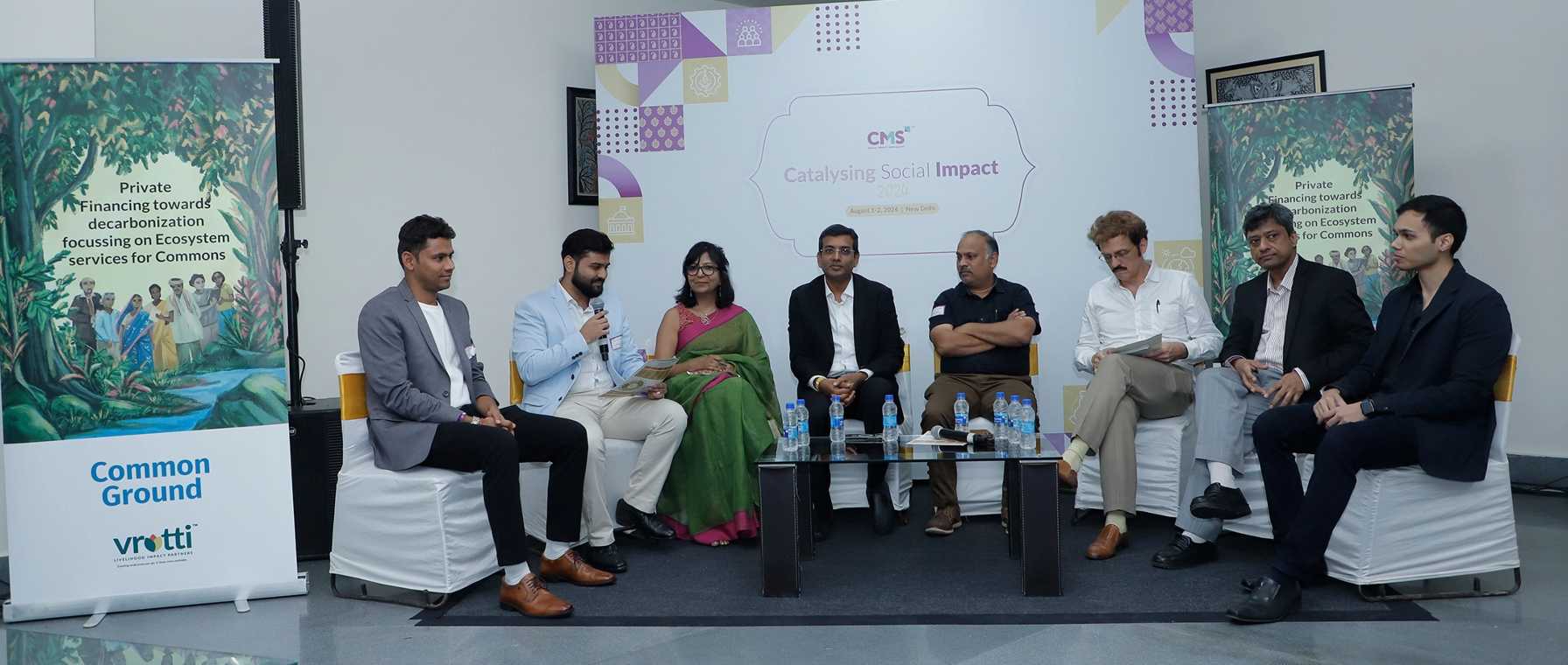
The connection between commons and decarbonization underscores the urgent need to involve private capital in sustainability efforts. Leaders from banking, conservation, and corporate sectors engaged in a comprehensive dialogue about the crucial role private markets play in addressing environmental challenges, emphasising that sustainability goals cannot be achieved without their involvement.
A key point raised during the discussions was the significant financing gaps in ecosystem services. Existing financial models were deemed insufficient, with an urgent call to develop innovative mechanisms, particularly those that could transform biodiversity into measurable financial value. There was also a strong push for new financial tools, leveraging corporate social responsibility (CSR) funds and emerging platforms like Social Stock Exchanges (SSE). These tools were seen as crucial in bridging the current funding gaps and accelerating investments in ecosystem services.
The lack of clear business models and return on investment (ROI) for ecosystem services was another major issue. Examples, such as ITC’s sustainable agriculture practices, were highlighted to show how integrating community benefits into business models could provide both environmental and financial returns. The concept of monetizing ecosystem services was underscored as a necessity to incorporate their value into long-term business strategies.
One of the standout insights was the issue with CSR funds. Despite the substantial allocation of approximately ₹40,000 crore annually in India, very little of this goes toward biodiversity or ecosystem services, largely due to the short-term focus of these commitments. For meaningful impact, these funds need to be directed toward long-term projects that span at least 10-15 years. Catalytic philanthropic funding and government support were seen as essential to facilitate the transition toward market-based financing models.
The role of technology and data in promoting transparency, cost-efficiency, and traceability in ecosystem services also featured prominently. Trusted data could drive scalability while lowering operational costs, especially in rural settings where technological access remains a challenge. At the same time, the discussions emphasised the need for policy and regulatory clarity to create favourable conditions for private sector investment in these services.
One of the primary challenges discussed was the difficulty in measuring and reporting ecosystem services like biodiversity and water due to the lack of standardised metrics. Addressing this would be crucial for ensuring accountability and facilitating private investment. Overall, the session highlighted the need for collaborative partnerships, public-private initiatives, and innovative financial models to overcome the challenges in funding ecosystem services and scale successful projects.